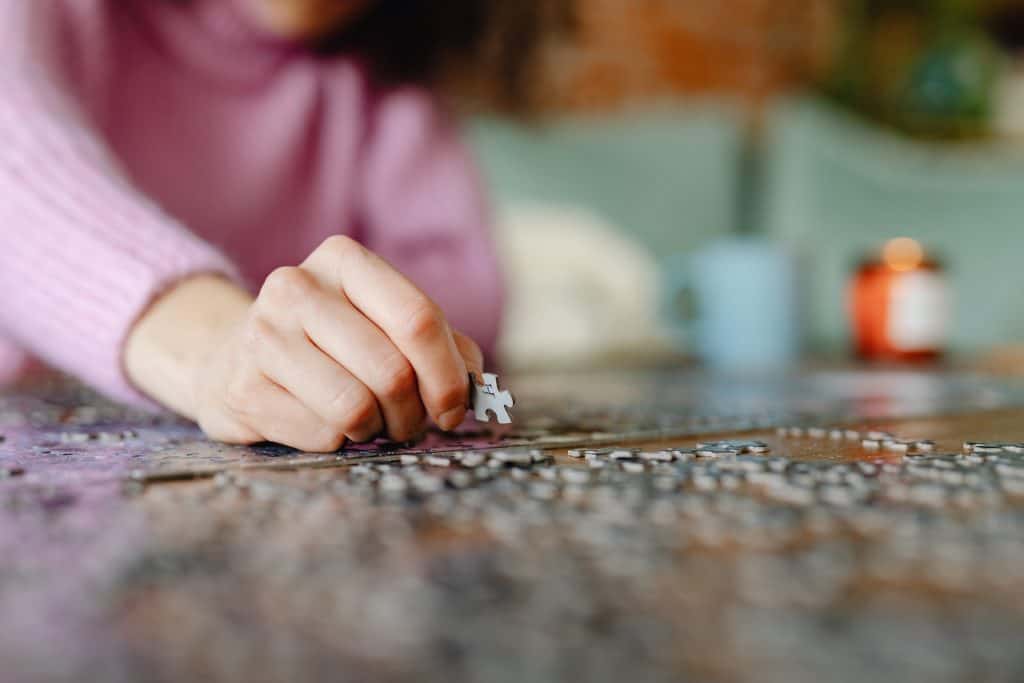Puzzle fanatics have long touted the many benefits of completing puzzles, and recently, curious onlookers have been wondering: “Does working on jigsaw puzzles help with patience and focus?” As it turns out, both casual and die-hard puzzle enthusiasts are onto something. There’s a cascade of cognitive benefits associated with the seemingly simple act of assembling puzzles.
Jigsaw puzzles, with their interlocking geometric shapes, require an all-encompassing effort to recognize shapes and fit them into the respective spaces. This requires a fair deal of patience and a laser-like focus that most of our day-to-day tasks don’t engage. From sharpening problem-solving skills to promoting the mind’s full ability of patience and focus, it’s clear that there are many health benefits to working on jigsaw puzzles.
The Relationship Between Jigsaw Puzzles and Patience

Patience is an essential skill that helps us deal with various complexities of life. Building jigsaw puzzles naturally induces patience as the act of piecing together a coherent image from a scatter of random fragments is inherently time-consuming and calls for a calm and steady approach.
Several studies support this belief, arguing that consistent puzzle-solving engagement can heighten our level of patience. One particular study, for example, noted increased levels of perseverance and resilience in individuals after regularly solving jigsaw puzzles.
Moreover, stories shared by other puzzle fanatics reveal how the consistent need to sift through numerous puzzle pieces promotes resilience in the face of repeated “failures” and ultimately boosts our capacity to wait and endure – the very essence of patience.
How Jigsaw Puzzles Enhance Focus and Improve Concentration
Much like how they foster patience, jigsaw puzzles also demand a range of cognitive skills that help improve focus and concentration. During the activity of building puzzles, your brain simultaneously employs logical reasoning and creativity. This duality calls for an enhanced attention span and encourages your mind to be in a state of focused meditation.
Neurologically speaking, working on jigsaw puzzles triggers our brains to produce dopamine, a neurotransmitter that regulates mood and concentration. As each puzzle piece falls into place, your brain releases dopamine, leading not only to feelings of pleasure and satisfaction but also to heightened concentration.
Therapeutic Effects of Solving Jigsaw Puzzles

The benefits of doing jigsaw puzzles go beyond merely helping you cultivate patience and improve focus. Completing puzzles serves as a stress-relieving activity, reducing stress levels in our daily lives. The exhilaration puzzle solving brings can create a therapeutic and calming effect akin to achieving a meditative state. It keeps your mind active and presents a perfect break from the fast-paced bustle of modern life.
Furthermore, the mental speed and acumen required to work on jigsaw puzzles can stave off cognitive decline. Engaging older adults, in particular, in regular puzzle-solving activities can help prevent memory loss and slow down the onset of illnesses like Alzheimer’s disease.
The Additional Benefits of Jigsaw Puzzles
Jigsaw puzzles can improve other critical cognitive functions aside from just boosting your patience and focus. For instance, solving jigsaw puzzles can enhance problem-solving abilities because it requires both critical thinking and creative thinking. The satisfaction derived from fitting a puzzle piece into the right spot can stimulate the brain, foster an increased sense of self-control, and provide potent mental stimulation.
Apart from these cognitive benefits, puzzles can also improve fine motor skills and develop spatial awareness. The consistent use of hands for arranging the pieces can help improve hand-eye coordination, a vital skill in performing various tasks.
Moreover, the act of visualizing where a particular piece fits sharpens spatial skills. It enables you to mentally prepare for tasks and activities that require spatial reasoning. In other words, building puzzles allows you to improve visual spatial reasoning.
Combining Creativity and Logic with Jigsaw Puzzles

In addition to the cognitive benefits and stress reduction we’ve already discussed, jigsaw puzzles also foster the crucial cognitive skills of creativity and logic. When assembling puzzles, we employ the use of both our left brain and right brain. The logical left hemisphere engages as it attempts to logically sort the pieces and identify which fits where. At the same time, the creative right hemisphere imagines the end result, picturing the completed image that the individual pieces will create. This simultaneous exercise of creativity and logic is not only healthy for your brain but can also improve your ability to solve complex problems in everyday situations.
Boosting Self-Esteem and the Sense of Achievement
Putting pieces of puzzles together can be an incredibly satisfying experience. Each puzzle piece placed stimulates the reward system in our brain, releasing dopamine, the neurochemical responsible for motivation and pleasure. This not only makes us feel good but also motivates us to complete the task further, improving our problem-solving skills, mental speed, and attention to detail. Each completed puzzle is a testament to persistence and can significantly boost self-esteem.
Physical Benefits of Jigsaw Puzzles
Often, discussions about jigsaw puzzles focus significantly on the cognitive benefits they offer. However, they also come with a share of physical benefits that are equally critical, yet slightly less heralded.
One such benefit is the improvement of fine motor skills. The ability to make precise, small movements is crucial in our daily routines. Regularly assembling jigsaw puzzles can substantially enhance this ability.
Lastly, jigsaw puzzles require the player to pick up, turn, and fit puzzle pieces together accurately. This activity can enhance hand-eye coordination and additionally tune our motor abilities. Therefore, the benefits of jigsaw puzzles spill over into our physical realm, making them a holistic activity beneficial for our well-being.
Social Benefits – Bonding through Shared Achievement
Jigsaw puzzles can serve as a significant social activity, allowing for quality bonding time with family or friends. The process of collaborating to complete a puzzle enhances the whole group’s dynamic by strengthening their bond.
Working together to solve a puzzle naturally fosters an environment of collaboration. The need for effective communication and cooperation significantly improves as everyone works towards achieving the common goal of completing the puzzle.
Moreover, achieving this shared goal not only enhances communication but also fortifies relationships. Everyone who participated shares in the feeling of accomplishment and mutual triumph, cementing their connection.
In essence, the shared achievement of completing puzzles can be an immersive and powerful experience. It fosters a sense of bonding and elevates interpersonal skills, making jigsaw puzzles an excellent choice for group activities.
Mental Health – A Powerful Tool
Beyond the cognitive and social benefits, jigsaw puzzles can play a significant role in maintaining and improving mental health. A study published in the Archives of Neurology found that keeping the mind active with puzzles and other mental activities can significantly delay the onset and reduce the severity of Alzheimer’s disease.
Furthermore, the concentrated attention and patience required when solving jigsaw puzzles can induce a state akin to meditation. This focused meditation can reduce stress and improve mood, making puzzles not just a game, but a means of relaxation and tranquility.
Enhancing Memory and Recollection with Jigsaw Puzzles
Jigsaw puzzles serve as a fantastic exercise for boosting short-term memory. Engaging in puzzle-solving tasks often involves recalling specific details about the puzzle pieces. This can range from the color, size, or shape of pieces you’ve encountered before.
This process allows your brain to construct a mental picture of what’s missing. This forms an integral part of the problem-solving aspect and in turn, strengthens your ability to recollect.
The continual recall and testing of memory help to enhance not just the recollection process, but also improve your short-term memory significantly.
The more puzzles you conquer, the better your memory becomes. The benefits of this improvement extend beyond the puzzle board and can have a positive impact on your day-to-day memory recall.
Jigsaw Puzzles and Brain Development in Children

Jigsaw puzzles can significantly contribute to children’s overall learning and development. The tangible and engaging nature of puzzles has a unique appeal to young learners, stimulating their natural curiosity and problem-solving skills.
Building jigsaw puzzles can enrich children’s cognitive growth in many ways. They present a fun way for children to engage their problem-solving abilities, a skill that will serve them well in their academic journey and their future occupations.
Further, the activity of building jigsaw puzzles strengthens children’s fine motor skills. The manual dexterity they acquire while navigating through various puzzle pieces effectively paves the way for more complex activities such as writing and drawing.
The practice of solving puzzles also sharpens spatial skills in children. Figuring out where each piece fits among scores of other pieces can greatly enhance their visual-spatial perception.
But the learning doesn’t stop with cognitive gains. Jigsaw puzzles can also contribute to children’s emotional development. The process can teach them patience as they navigate towards their goal one piece at a time. This practice can also imbue persistence as children learn not to give up until they complete the image.
Lastly, the close attention to detail demanded in puzzle-solving can heighten children’s ability to focus and concentrate, critical skills that underpin successful learning in all areas.
In essence, jigsaw puzzles are a valuable tool in children’s learning kit, packed with opportunities for cognitive and emotional growth.
Does Working on Jigsaw Puzzles Help With Patience and Focus?
In conclusion, the act of solving jigsaw puzzles does indeed cultivate patience and enhance focus. More than that, it’s a fun, stress-reducing activity that stimulates our brain, keeping it active and healthy. Anybody looking to improve their cognitive skills, reduce stress, and enjoy myriad health benefits, should definitely make jigsaw puzzles a part of their routine, regardless of age or expertise level.

